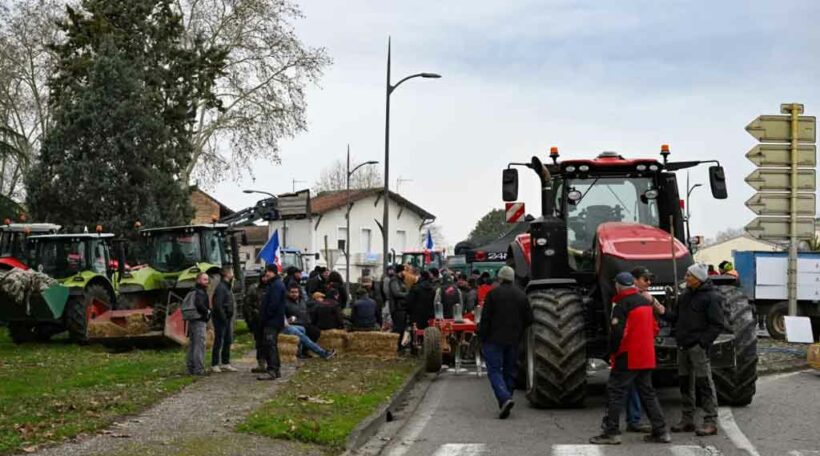The impact of inflation, low wages, unfair competition, bureaucracy, income inequality and European environmental standards that they describe as too severe were at the centre of the complaints from the second half of January to the beginning of February, mobilisations that counted on the blocking of motorways with tractors as their main tool, although it was not the only one.
By Waldo Mendiluza
The obstruction on 18 January of the A64 road linking the southern cities of Toulouse and Bayonne (French Basque Country) marked the start of the protests, which escalated to an average of at least 10,000 protesters a day with 5,000 tractors, in some cases breaking into cities, with isolated incidents of violence.
With Prime Minister Gabriel Attal’s unveiling of a package of measures on Thursday 1 February, tensions eased, but farmers were not satisfied with the package as a whole, and one sector vowed to keep up the pressure.
The list of actions included the creation of a European force against sanitary fraud, a ban on imports of fruit and vegetables treated with the bee-damaging pesticide thiacloprid, safeguard clauses against poultry imports from Ukraine, and vigilance on issues of origin.
Attal also offered 150 million euros in fiscal aid to farmers and promised to review the issue of pensions for farm workers, packages worth around 600 million euros.
The government, in the voices of President Emmanuel Macron and the prime minister, also reiterated France’s refusal to back the European Union (EU)-Southern Common Market (Mercosur) agreement, comprising Argentina, Bolivia, Brazil, Paraguay and Uruguay.
Another measure concerned the government’s crusade to enforce the law of equilibrium in trade relations, which protects farmers from possible economic losses in trade operations.
A controversial decision to curb farmers’ anger was the pause in the implementation of the Ecophyto Plan, activated in 2009 with the aim of reducing the use of pesticides.
Environmental organisations and politicians questioned the move, including Marine Tondelier, leader of the Europe Ecology Greens party, who said she was fed up with objectives and projects that are never respected.
Everyone has lost with this government decision, for 15 years they promised us with this plan to reduce the use of pesticides, but it did not happen, she said.
UNREST DOES NOT GO AWAY
The French National Federation of Farmers’ Unions (Fnsea) and the Young Farmers (JA), the most vocal during the movement, called on their members to suspend the motorway blockades, in reaction to Attal’s announcements earlier this month.
In statements to the press, the president of the Fnsea, Arnaud Rousseau, and his counterpart from the JA, Arnaud Gaillot, said that the time had come to move on to a new form of mobilisation, although they warned the government that they are prepared to resume the pressure if concrete results do not materialise.
In this respect, they set the Paris Agricultural Show, scheduled to begin on 24 February at the Porte de Versailles exhibition centre, as an initial deadline.
If our demands have not been met by June, we will not hesitate to return to a general movement, Gaillot stressed.
For his part, Rousseau insisted that the “anger is not behind us”, a warning that the executive says it is not ignoring.
The most visible moment of the crisis is in the past, but farmers have not stopped for eternity, accepted agriculture minister Marc Fesneau on CNews, who reiterated promises of further announcements to benefit the countryside.
Considering the extent of farmers’ unrest within the EU, with protests also in Germany, Belgium, Spain, Italy, the Netherlands, Poland and other member states of the 27-member bloc, President Macron, in Brussels, admitted the urgency of a new agricultural policy for the 21st century.
In his questioning, he criticised the unequal sanitary controls, the problems in the treatment of imports – less rigorous checks than at home – and the EU-Mercosur agreement, on which there is no consensus within the Union, with leaders such as the German chancellor, Olaf Scholz, taking a contrary stance, presenting himself as a supporter of the agreement.
If the Fnsea and JA agreed to abandon the motorway blockades with tractors, other unions actively involved in the mobilisations ruled out relaxing the pressure, in particular the Rural Coordination and the Peasant Confederation.
“We haven’t won anything at all,” said Rural Coordination spokesman Patrick Legras, in response to the government’s decisions.
MUCH TO BE DONE
From politics and organisations, there are many voices denouncing measures that do not solve the situation in the countryside, described in the National Assembly as catastrophic by the communist leader André Chassaigne.
We do not see any measures to respond seriously and sustainably to the catastrophic situation facing French farmers, with a distortion of competition in the face of massive imports of products that do not respect social and health standards, the consequences of free trade and insufficient income, warned the deputy.
In an open letter published on Monday 5 February by the daily Le Monde, social and trade union organisations criticised a crisis that cannot be resolved by government measures, because “although they seem to benefit everyone, the largest production units will be the winners and will continue to devour the small ones”.
Only a reorientation of European and national agricultural policies will guarantee sustainable solutions over time, they said.






